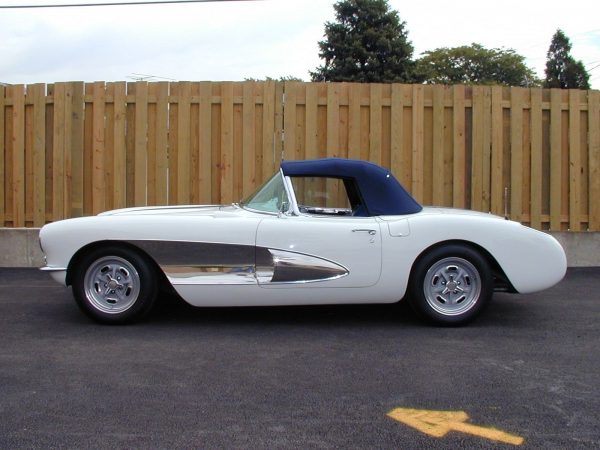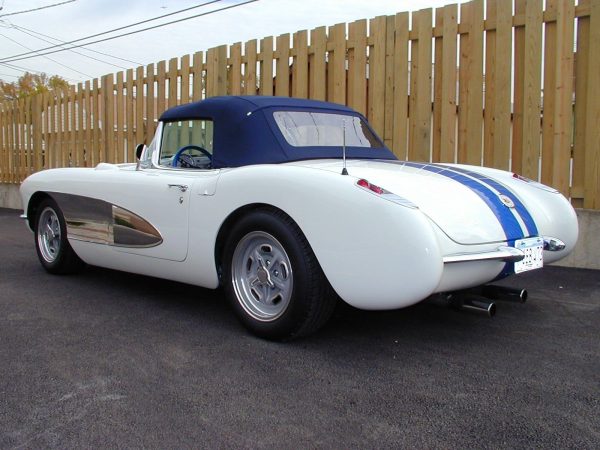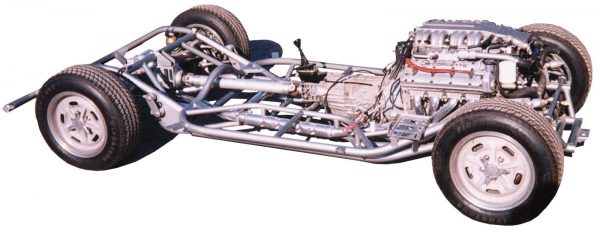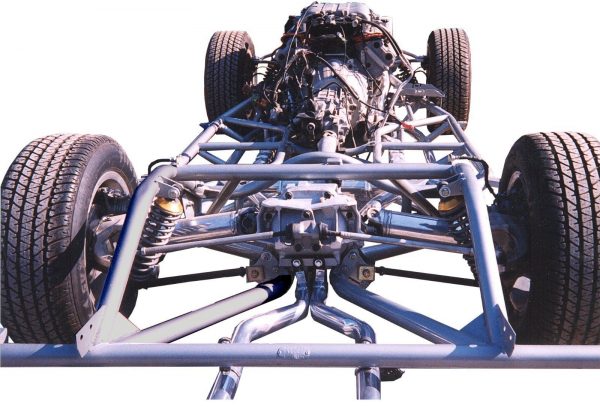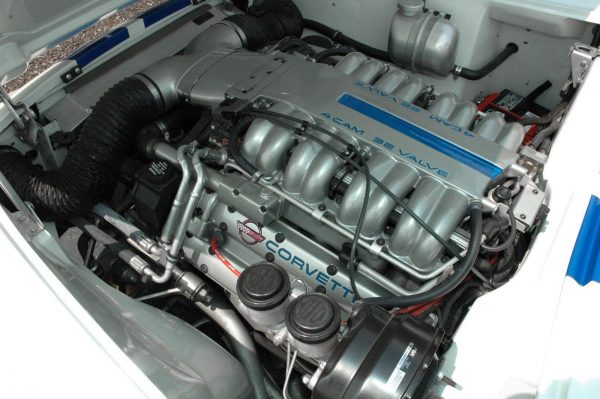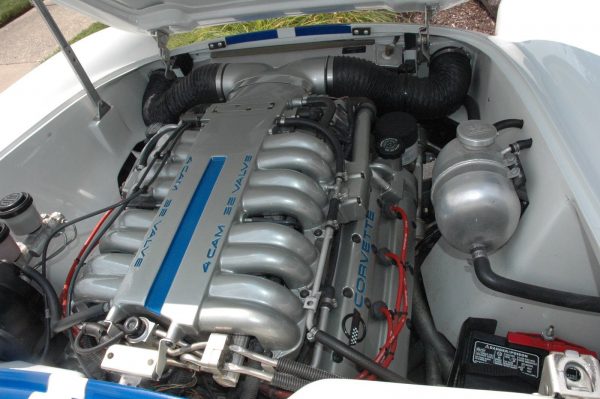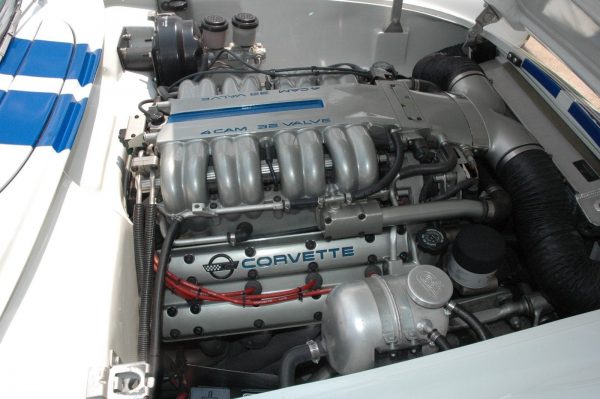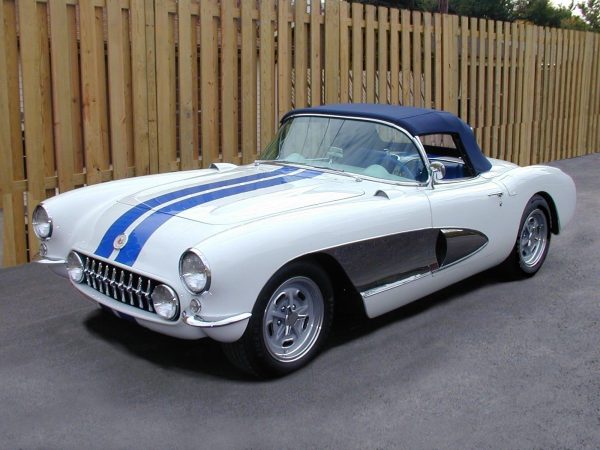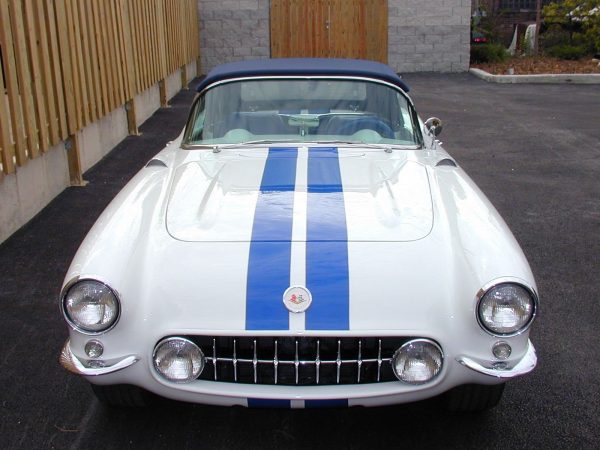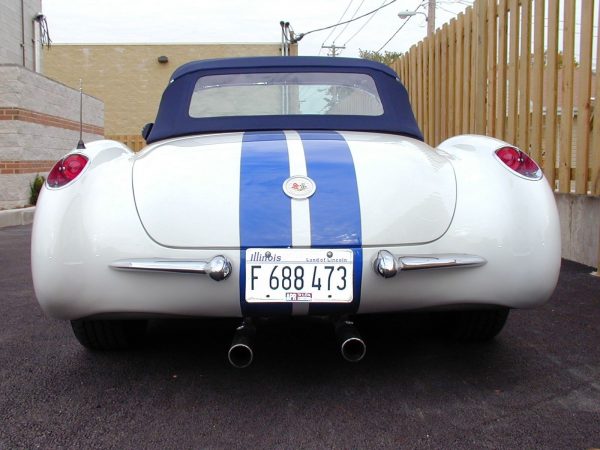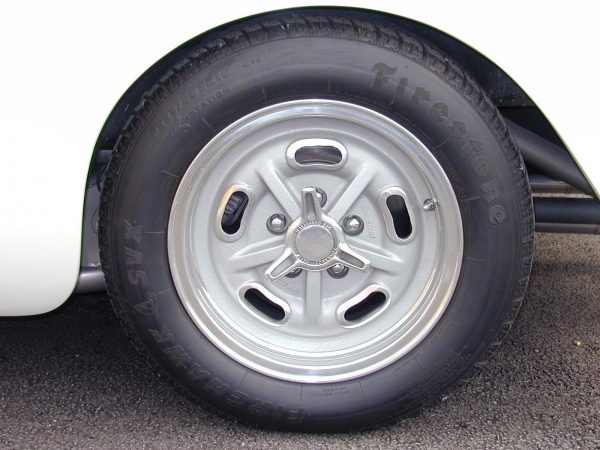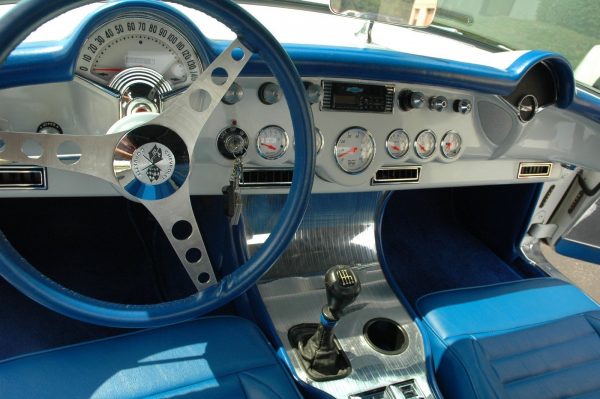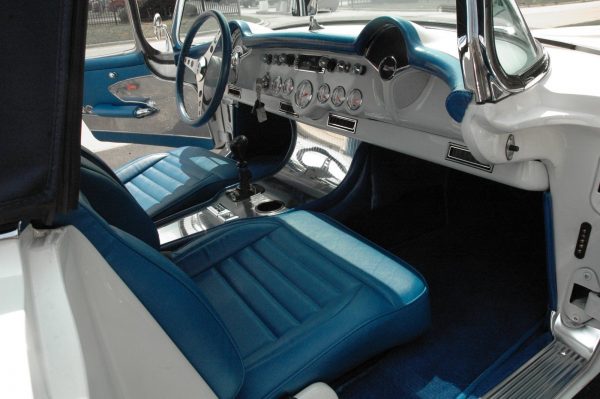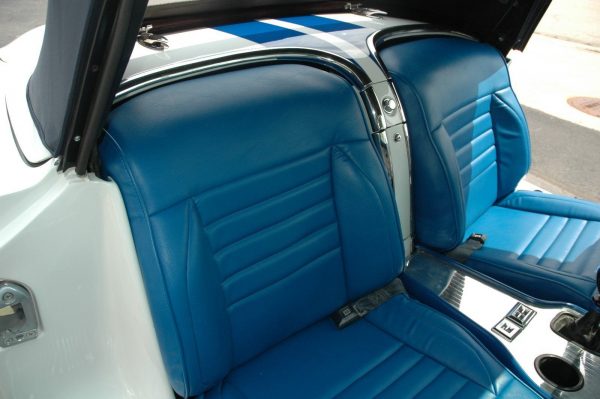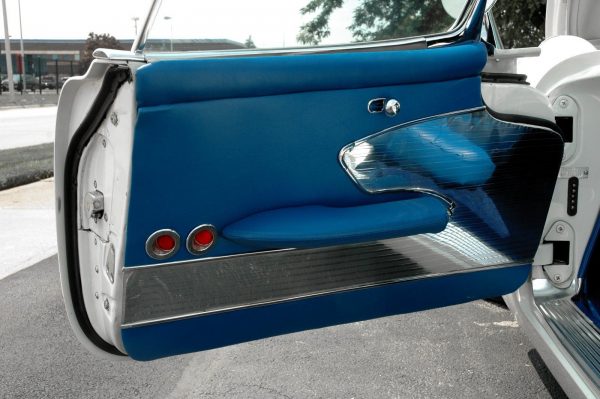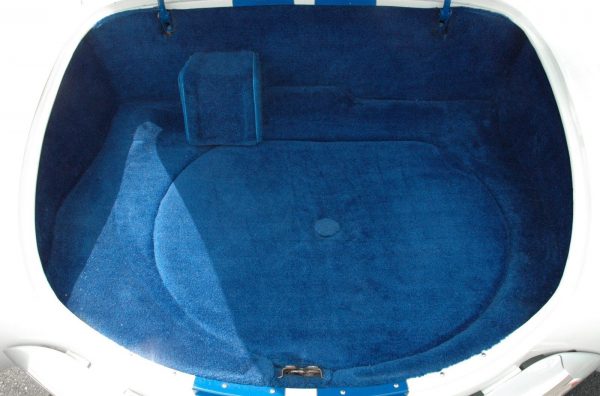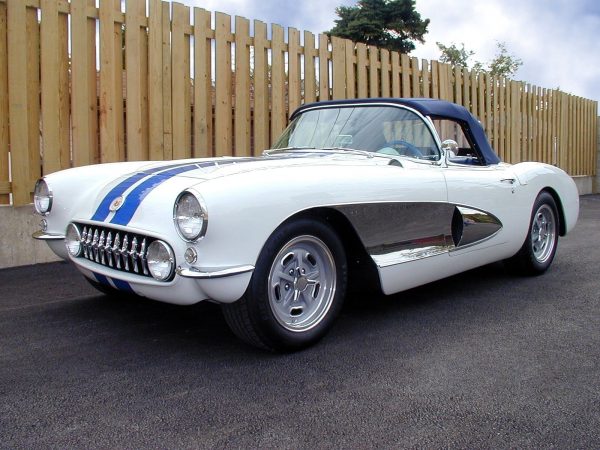
1957 Corvette SRIII with a LT5 V8
Ken Hanna is the co-founder of Chicago’s Chevy/Vettefest Nationals, owner of Lectric Limited that makes reproduction harnesses for the Corvettes, and has restored three 1957 Corvettes to NCRS Top Flight and Bloomington Gold standards. In one way or another, Ken has been involved with Corvettes for over 50 years. In 1990 he set out to build the ultimate 1957 Corvette which took eight years to realize.
The project started when Ken commissioned Mike Stockdale of Automotive Design Center to build a custom chassis made from round tubing. The chassis would incorporate Corvette C4 suspension, steering, and disc brakes with ABS system. Mike decided to call the project SR-3 based off the SR-2 Corvettes that competed at Sebring from 1956-1957. Mike would later create a company called SRIII Motorsports that has produced 200+ Corvette tube chassis.
When it came time to choose a heart, Ken went with the most advanced V8 at the time, the LT5 V8 (Gen2 SBC) from the Corvette ZR-1. The 5.7 L LT5 was designed by Lotus Engineering and featured a double-overhead camshafts, aluminum block and head, and made 375 horsepower (280 kW) and 370 lb-ft (502 Nm) of torque. The engine sent power to the rear wheels through a ZF six-speed manual transmission to a Dana 44 rear end with 3.73 gears.
Ken couldn’t allow himself to tear apart a 1957 Corvette in good condition for the project. So he purchased one from Corvettes at Carlisle with the body, glass, and convertible frame in good condition but the chassis was far too gone for restoration. The body is now covered in white paint with Royal Blue racing stripes similar to the 1957 Corvette Sebring race cars. Other exterior modifications include polished stainless steel side scoops, painted grill set back two inches with 7-inch lights, and dark blue convertible top.
Ken says this car was built to be driven and he’s proven that by driving over 7,000 miles since it was completed. However Ken has decided it’s time for the one of a kind Corvette to find a new home. Please contact Lectric Limited or by phone 708-563-0400 if you are interested in purchasing the Corvette.
Ken’s full description of the Corvette included below:
My name is Ken Hanna and I own this 1957 SRIII Corvette. I am the co-founder of Chicago’s Chevy/Vettefest Nationals, and also the owner of Lectric Limited (manufacturer of reproduction harnesses for the Corvettes and other GM cars). I have been active in many aspects of the Corvette hobby/industry for close to 50 years. In the past, my passion was restoring 1957 Corvettes to concourse original condition. I restored three to NCRS Top Flight, and Bloomington Gold standards.
But I always admired the special design features of the ultimate Corvettes of ’56-62 era, the SR2s, Sebring race cars, the Motorama dream cars and one-off specials that were built by the factory at that time.
In 1990, I wanted to design a Corvette to fit a theme that would incorporate the features of those vehicles. But I also wanted to do something that was that was not being done at that time. I commission a designer; Mike Stockdale of Automotive Design Center to build a round tube chassis using the latest Corvette suspension of the day and to call this Corvette an SRIII. Mike went on to create SR III motorsports. Mine is serial # 1.
This Corvette SRIII “Prototype” was custom built to my specifications. Today they a call a Corvette of this type a “Restorod” or “Restomod”. I do not believe those terms accurately describe this Corvette SRIII. A Restorod/Restomod is built it using styling feature and design trends of the time it is built. They quickly become dated; as custom cars do. The design of this SRIII is also not timeless but it is designed to replicate the design and styling characteristics of ultimate Corvettes of 1956-57 period. These were the SR2s, Leman, and Sebring race cars as well as the Motorama dream cars and one-off specials that were built by the factory during the golden age. It was also decided to restrict the Corvette’s aesthetic appearance to a theme that reflected the ‘56-57 era where my main interest in the hobby had always been. So the search began for components to fulfill this vision of the perfect Corvette.
This Corvette is the product of an 8 year “development” process. Why call it a development process and not a restoration project? After 20 years in the hobby and 3 complete frame-off restorations of 1957 Corvettes, I believed that Chevrolet left room for improvement; not to mention 43 years of automotive progress had passed since the ‘57 Corvette left the factory. I wanted to incorporate many of the technological advancements and safety features that have come about to improve the performance, drivability and handling of this classic car. It was important to maintain that “Corvette feel”.
Chassis:
The search was on to find someone who could design and build a chassis that would incorporate a C4 Corvette front & rear suspension and steering. My requirements were that the chassis be made out of all round tubing, required no structural members intruding into the interior compartment, and that it had fully-adjustable coil-over suspension.
After visiting numerous automotive fabricators and builders, I entrusted the design of the frame to Automotive Design Center in Posen, IL. He decided to call the project and car the SR-3 (in reference to the SR-2 Corvettes that were built to compete at Sebring in 1956-57 and represented state-of-the-art developments in Corvettes of that era). After a reasonable amount of time, Automotive Design Center came through as promised with a frame that met all of his criteria.
This SRIII is the Serial #0001 SRIII chassis built by what has become SRIII Motor sports. As of this date, SRIII Motorsports has built over 200 of these chassis for other Corvette enthusiast desiring state-of-the-art handling and performance from their previously solid axle Corvettes.
Engine and Drive Train:
The next step was to select an engine and drive train. The ultimate Corvette engine at that time was the LT5, dual overhead cam, all aluminum engine used in the ZR1 Corvette with the accompanying German built ZF, 6-speed transmission. A brand new ZR 1 engine with ZF 6 speed was purchased. Keep in mind that the ZR1 engine option was only released in 1990 and ZR1 engines were not easy to obtain.
This engine was originally assembled into a ZR1 Corvette on November 26, 1990. On June 12, 1991, this new, unsold vehicle was selected by Chevrolet Engineering for use in 1992 emissions testing. The 1991 motor was pulled from the vehicle and replaced with a 1992 motor. I was fortunate enough to be able to obtain this same motor. Naturally, installing a ZR1 Corvette motor into a 1957 Corvette would require specific modifications.
– A custom air inlet was fabricated to provide a transition from the twin air ducts that bring cool air in through K&N filters, mounted in the grill area, to the engine. The ducts run through the original air inlets that were used for the factory fresh air heater inlets. Very similar to the rare and much sought after 1957 Cold Air Box Corvette of the day.
– Engine cooling is provided by an aluminum radiator that was custom fabricated by Be-Cool to work specifically with the unique demands of this engine. Two electric fans were installed in a push-pull arrangement to provide maximum air flow. The radiator is mounted in the stock core support.
A stainless steel gas tank was fabricated by Rock Valley and incorporates a high-volume electric fuel pump specific to the demands of the engine.
Body:
With Chassis and drive train underway, the next major item needed was a ‘57 Corvette body. I did not want to “destroy” a car that was suitable for restoration. So, I looked for a car that was beyond restoration. A car matching his criteria was found at Corvettes at Carlisle. The car that was purchased had a good body, windshield and convertible top frame and much of the trim…but nothing else. The frame was beyond restoration.
Wheels:
The wheels had to be “Kidney Bean” Halibrand’s, reminiscent of the 1956-57 SR-2s and Sebring race cars. These wheels were 6″ wide x 15″ diameter. But, he knew that they were not only highly unattainable, they were too narrow. 6″ wide tires would not accommodate the type of tire a ZR1 engine demanded, and the 15″ diameter would not clear the C4 disc brakes. It appeared to be an impossible dilemma. But, as luck would have it, a long-shot call to Halibrand to see if they had anything similar to what he wanted, proved very rewarding. When I called, I learned that Halibrand had just re-introduced the original Kidney Bean style wheels, but not in the original 15 x 6 size. They now offered a 16″ wheel that would clear the C4 brakes, and offered it in 6″, 8″ and 10″ widths and in various offsets. These wheels were only offered for a short period of time and I was very fortunate to get them.
The 8″ version was selected because the 10″ would have required modifications to the body in the form of either flared back wheel wells or tubbing, which would have precluded the use of a convertible top. Either of which would have been unacceptable for both aesthetic and practical reasons.
– The tire size selected was P225/60 ZR16 front and rear. These tires would give the maximum width allowable without body modifications, and provide the best traction and handling.
Brakes:
The standard C4 brakes with a full functioning ABS system was used. It was found that the only brake booster and master cylinder combination that would provide proper braking and proper hood clearance, coincidentally, was the original ZR1 booster. Making the ABS work was a challenge in itself that would require too much time and space to relay.
Wiring Harnesses:
After several phone calls, I located “Street and Performance” in Little Rock, AK. They assured me that they could not only provide a the proper harness, but they could also re-program the computer chip to eliminate the forced first to fourth shift and also remove the rev. limiter and other computer functions that would prevent the engine from running properly.
Exhaust:
Although fortunate to find a ZR1 engine, it was missing the factory headers. Further research showed that the original headers would not fit the new chassis. At the time, the most prominent people doing development work on the ZR1s were Callaway, Doug Rippie Motorsports and Lingenfelter Performance Engineering. After calls to all three, Lingenfelter was the only company who could provide headers that were compatible with the engine and solved the chassis clearance problems, with the added bonus of a modest increase in power.
The rest of the exhaust system consists of 2-1/2″ pipe and chambered mufflers which provide little restriction. Since an emission testing is not required on a 1957 vehicle, the catalytic converters were eliminated. The entire system was the Jet-Coated to keep it looking fresh.
Rear End:
The Dana 44 Posi. was modified with an optional 3.73:1 gear.
Exterior Custom Features:
The most prominent features are the bright polished stainless steel side coves and scoops which are reminiscent of the SR2. Ken had always admired this feature which was not only on the SR2s but several of the GM styling and Motorama Corvettes of that era.
– The grill oval is painted body color for a somewhat mono-chromatic look. But what stands out most are the 7″ driving lights which were integrated into the grill. The grill bar was also set back 2″ into the opening. The front bumperettes and license brackets were eliminated for aesthetic reasons.
– The convertible top was custom made by Crown with a dark blue stay-fast material (as opposed to the original factory vinyl material). This gives the car an updated, elegant look and blends well with the strips and interior.
Interior Custom Features:
– Both the carpeting and interior is finished in royal blue. New contoured seats were custom fabricated
– The door panels incorporate features that were found on Corvettes between 1957 and 1962. Including the aluminum door panel material used in 1961.
– The center console uses that same aluminum material used on the door panels. The console starts at the lower dash and works its way down and rearward between the seats to the original glove box.
– As would be expected, the car features air conditioning; which would provide another unique problem. There was no place to put the air outlets. A lower dash extension was blended into the lower dash area to provide the necessary space for the outlets. It was a challenge to accomplish this without making it look like an aftermarket add-on as opposed to a factory option – which was the goal. Both the console and lower dash extension look like they were born there.
– A custom steering wheel was provided by Corvette Central. This wheel utilizes the stock hub and spoke design as the original wheel but is smaller in diameter and has a thicker rim. It is wrapped in the same royal blue material that finished the rest of the interior. The steering column was also shortened, moving the steering wheel closer to the dash to provide a better driving position.
– Autometer gauges with white background and black lettering were selected as a matter of personal choice. This did require a good deal of modifications to the speedometer lenses to provide the necessary color match.
Additional Features:
Power steering, power brakes, power cowl vent, power windows, power door locks, and power trunk release with remote. AM/FM stereo.
Paint Scheme:
The paint scheme is reminiscent of the factory ‘57 Corvette Sebring race cars – white with royal blue racing stripes. The paint selected was Glasurit brand paint because of its durability.
Displayed at these Car Shows:
– Corvettes@Carlisle – Chips Choice (by invitation only)
– Chicago Chevy/Vettefest Showcase (feature car)
– Mid America Fun Fest (feature car)
This Corvette was not built as a trailer queen. It was built to be driven! After 7,000 miles it has fulfilled all of my goals and expectations: classic looks, fabulous handling, brute power. And after 7,000 miles, the car has some minor imperfections as would be typical on a car with this amount of miles. Personal inspection is recommended before purchasing.
My poor health and age dictate that I part with the car of my dreams.
This car is currently garaged in the Chicago area. If you would like to inspect this car beforehand, please call for an appointment. Serious inquires only! Mike @ 708-563-0400 ext. 309 (Monday-Friday, 8AM-4PM CST).
~ ~ ~ ~ ~ ~ ~ ~ ~ ~ ~ ~ ~ ~ ~ ~ ~ ~ ~ ~ ~ ~ ~ ~ ~
MAGAZINE ARTICLES & TV COVERAGE on the ’57 Corvette SRIII Prototype:
VETTE MAGAZINE
https://www.lectriclimited.com/ebay/vette_magazine.pdfCHEVY RUMBLE MAGAZINE
https://www.lectriclimited.com/ebay/chevy_rumble_magazine.pdfVETTE VUES
https://www.lectriclimited.com/ebay/vette_vues_magazine.pdfMOTORSPORTS UNLIMITED TV
https://www.lectriclimited.com/ebay/motorsports_unlimited_tv.pdf
Source: eBay via Schwartz Performance FB page

